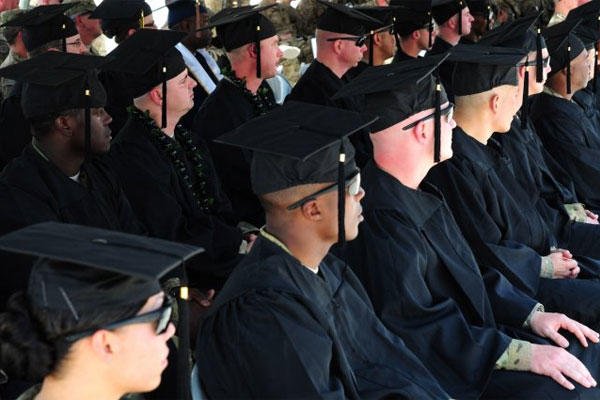[Editor's Note: This article was provided by the Department of the Army, however, the implementation of the DoD Voluntary Education Partnership MOU impacts Sailors, Airmen and Marines as well.]
WASHINGTON -- Effective March 1, Soldiers will no longer receive tuition assistance if their college or university has not signed the Defense Department's "Voluntary Education Partnership" Memorandum of Understanding.
Soldiers who already received tuition assistance, or TA, funding for courses can complete those courses even if they extend beyond March 1. They just can't sign up for new courses after March 1 if the school has not signed the Memorandum of Understanding, or MOU, according to Pamela Raymer, Ph.D., chief of the Army Continuing Education Division.
As of Feb. 14, of the 3,000 schools in GoArmyEd, the Army's enterprise system for accessing TA and other educational services, 2,153 schools have signed the MOU, Raymer said.
About nine percent of Soldiers using TA are enrolled in schools that are not signatories to the MOU. Many of those nine percent are National Guard Soldiers and candidates in ROTC programs, she said.
Soldiers should, as soon as possible, visit http://www.dodmou.com, to see if their school has signed the memorandum, Raymer urged. If the school has not signed, then Soldiers should make arrangements to transfer to another educational institution that has signed the MOU.
Also, Soldiers are encouraged to speak with their unit education counselor, she said. Counselors can be found at 89 active Army education centers, 16 Army Reserve Readiness Command education offices and 54 National Guard education offices.
Soldiers might wish to check with their school administrators to see if the school intends to sign the MOU, but Raymer said that is not something a Soldier would be required to do, as the Army and DOD have been working hard to reach out to those schools.
While the new requirement could negatively impact Soldiers attending a school that is not a signatory to the MOU, the intent of the memorandum is to protect the Soldier, Raymer said.
Examples of the protections that schools in the program must provide are adherence to the Service members Opportunity College, or SOC, principles, which include:
-- maximizing transfer credits
-- greater consideration of college credit for military experience and academic testing
-- minimizing residency requirements
-- adopting policies banning inducements for enrollment
-- refraining from high-pressure recruitment tactics to eliminate aggressive marketing to Soldiers.
The MOU does not impact the Montgomery G.I. Bill or Post 9/11 GI Bill, so Soldiers attending a school that does not sign the MOU can still use those options if they choose.
According to the Army's Continuing Education Division, in fiscal year 2012, 201,000 Soldiers used TA, which disbursed $373 million to them. Of those Soldiers using TA, 2,831 earned associate degrees, 4,495 earned baccalaureates and 1,946 received graduate degrees.




























